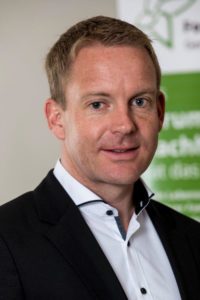Interview with Florian Schütze, Business Unit Manager Society and Environment International, Lidl Deutschland:
 Targeted sustainability management is of great importance to the retailer Lidl. This year, Lidl Germany published its Sustainability Report for the financial year 2016 – 2017, in which it provides detailed information on the anchoring of sustainability as a guideline of corporate strategy with objectives and measures. Lidl is a member of the Bremen Cotton Exchange Association. The editors of the Bremen Cotton Report were briefed on the details of the company‘s approach to sustainability by Florian Schütze, Business Unit Manager Society and Environment International.
Targeted sustainability management is of great importance to the retailer Lidl. This year, Lidl Germany published its Sustainability Report for the financial year 2016 – 2017, in which it provides detailed information on the anchoring of sustainability as a guideline of corporate strategy with objectives and measures. Lidl is a member of the Bremen Cotton Exchange Association. The editors of the Bremen Cotton Report were briefed on the details of the company‘s approach to sustainability by Florian Schütze, Business Unit Manager Society and Environment International.
Cotton Report: Mr. Schütze, what were the reasons for the expansion of sustainability management at Lidl in the last two years?
Florian Schütze: At Lidl, sustainability management has been part of our corporate strategy for many years. With the Sustainability Report in Germany, we have provided information about our activities in a comprehensive and consolidated report for the first time.
As far as our approach to sustainability is concerned, we are clearly positioned. For a long time now, we have identified five fields of action Lidl-wide where, by acting sustainably, we not only live up to our promise of quality, but also ensure that we remain viable as a company. We are therefore working systematically in the fields of environment, society, product range, business partners and employees to constantly improve ourselves.
In sustainability management, we focus on where value creation takes place, because only then can we really improve things and achieve results. We take a close look at the pre-production of raw materials and agriculture, keep an eye on product processing and the supply chain, optimise our own operations and processes in branches and warehouses, and finally look at topics that are relevant to our customers and society, such as questions concerning the purchase and disposal of our products.
All in all, sustainability management to us means: taking responsibility for our actions where our business has an impact.
What are examples of ecological, social and economically sustainable fields of action at Lidl?
In the area of “environment”, we are talking about a variety of topics that take place at different points in the value chain. We are one of the first food retailers to adopt the Greenpeace Detox Commitment targets or, together with our suppliers, we are optimising the use of packaging so that we will use 20 percent less plastic for own label packaging in the future and increase the use of recycling technologies.
In the “product range” field of action, our main concern is to make our products more sustainable and to make it possible for our customers to choose the right products. Here, too, we are talking about a wide range of topics. For example, we are a founding member of the Animal Welfare Initiative and want to help systematically improve conditions in livestock farming. We document our commitment with recognised sustainability seals and labels to provide orientation for the customer.
In the “business partners” field of action, we are designing measures to put the cooperation with our suppliers on a fair and thus sustainable foundation. For example, since 2006 we have been offering products such as coffee or chocolate with a Fairtrade seal, we have been a member of BSCI since 2007 and we are a founding member of the Partnership for Sustainable Textiles, which in addition to social standards, also addresses ecological aspects within the supply chain.
What is the importance of transparency in implementing sustainability targets?
Sustainable action that is not transparent is not sustainable. That’s why we create transparency at the point of sale. For the customer, this means traceability, product labelling, content and nutritional information, to provide them with all the information they need to make an informed purchase decision. For example, we provide access to a list of more than 600 suppliers of our textile and footwear brands and their production sites – making us the first grocery retailer with a non-food range to introduce such a service. For us, transparency also means regularly providing information about our activities, publishing our positions and attitudes on specific topics, and taking critical questions from organisations.
Naturally, we approach our sustainability goals in close cooperation with our suppliers. Here, we repeatedly experience that our suppliers can develop further together with us and are ultimately also able to act more competitively on the market.
What role does detailed know-how of manufacturing processes at production sites play?
When we talk about sustainability, we are, among other things, talking about the way our products are made. Without detailed know-how of operational processes, it is not possible to deal with this topic at all. Based on the knowledge of the production processes, we create specific requirements, for example to reduce the environmental impact in the supply chain.
Alongside other countries in Asia, Bangladesh and China are important manufacturing countries for our footwear and textile brands. Accordingly, these countries are also a focus of the sustainability measures. We have the environmental performance of the companies tested by independent, accredited institutes. In the reporting period 2016/17, 180 audits were carried out.
What is the share of cotton textiles and clothing at Lidl? What proportion will cotton products have in the future?
There is still a considerable proportion of cotton. Our product range is very much geared to customer demand and is constantly changing. We believe that cotton products will maintain their current high level in our range due to their pleasant characteristics and popularity among consumers of everyday clothing.
You wish to further increase the share of cotton from projects with a sustainability approach in your products. In your opinion, are certified textiles available in sufficient quantities to enable you to fulfil your goals?
Also, for reasons of transparency and credibility, we place value on purchasing products that contain certified cotton. It should, wherever available, also be organic cotton. However, the fact is that it is not always easy to procure enough certified products in our required quantities. This not only applies to organic cotton, certified according to the Global Organic Textile Standard (GOTS), but also to Fairtrade certified cotton. Our goal is to increase the proportion of certified cotton by 30 percent, including organic cotton, by 2020.
Thank you for the interview.
The interviews in the column “Question Time“ embody the opinion of the respective interview partner and do not represent the position of the Bremen Cotton Exchange as neutral, independent institution.

